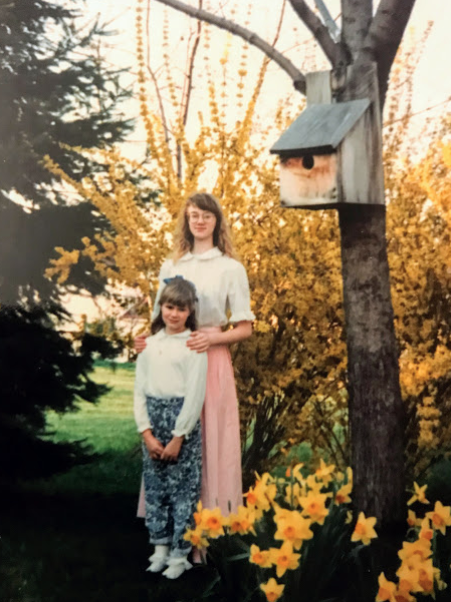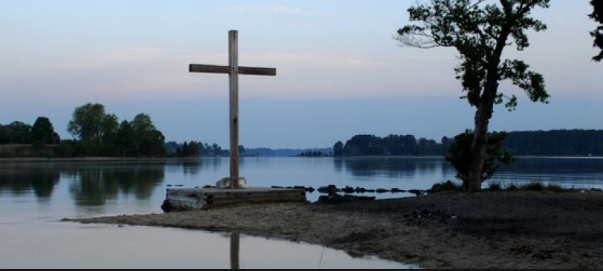My father grows beautiful gardens. When I was a child, he built me a sandbox, and a rose garden, a wisteria arbor with a swing, and a toy wooden boat with a rubber band motor that we sailed together on the lake.
When I was a child, he often enjoyed scaring me.
He would keep teasing, not listening, while I learned that to protest was to prolong an ordeal. If I cry, he’ll keep doing it until I don’t cry anymore. He tells me I am too sensitive, though with his training, by the time I was twenty, you could slam my finger in a car door and I wouldn’t flinch. I have no fear of a surgeon’s knife or needles, though I’m frightened, sometimes, when I hear him now at my door.
My father carefully taught me to go down the stairs safely, and caught me just in time when I tripped and fell, before I hit my head on a concrete slab. He gave me a puppy with golden fur to love and named her after a song. He split open the rocks I brought him, showing me the sparkling quartz inside. He carried me on his broad shoulders. He read me stories and made sure I memorized my multiplication tables. As I grew older, sometimes in the car I pretended to be asleep when we arrived so he would lift me up and carry me for a little while.
He told me stories about his own childhood haunted by grief, and betrayal and lack.
When I was a child, he often enjoyed scaring me.
My mother saw him throw me across a creek when I was four– “Cripple Creek”– because I had trouble walking for a while after that…that’s also a song. Was it just a day that I had trouble walking? A week? I remember them both laughing when I realized, horrified, that my back was hurt in such a way I could no longer touch my toes. Pain is funny? I remember them laughing above me, also, when a different pain terrified me; I was held down, a preschooler, shamed and hurt by a stranger with their permission, not protected. He likes telling this story, as a reminder of what might happen to me again if I complain. I learned not to complain.
My mother watched him set me, still so small, on a concrete post, high off the ground, say he was leaving, and walk away (were we in Baltimore? I can’t remember). I scraped my back jumping down, cracked my ankle, and ran after him, desperate…
…and he laughed, because I had believed him.
When I was a child, my father often enjoyed scaring me.
The person I most needed to trust was not always trustworthy.
He told me no boy would ever want to kiss me, and he kissed me himself whether I liked it or not (I learned to hold still). He calls himself “The King.” Years later I disobeyed and he took all my letters, my paintings, my journal– and threw them in a dumpster somewhere I could never find. He didn’t ask permission. The things that were most precious to me did not belong to me. I remember hearing, once, how when Dad was young, he threw a person in a dumpster, too, after an insult. Different dumpster, same anger?
My father helped how many– hundreds? Thousands? of children with disabilities graduate from high school, teaching math and history, helped young runners and wrestlers become champions. They needed him. What did I need? After all, I had enough to eat. He said he was retiring from wrestling– it was in the newspaper, I was excited I was going to have more time with him. He broke that promise. Wrestling mattered more, and winning. People told me my father was a great man; a hero. I knew I would never be so important.
My father was proud of my straight “A’s,” though. He patiently, patiently, patiently taught me to drive. When he thought I might be an architect, he took me to New York to see an exhibit on Frank Lloyd Wright. He took me to see paintings by VanGogh and Picasso.
Before my first birthday, he almost drowned me in the Atlantic Ocean. My mother saw the wave go over us both, saw him come up without me and look around– “I lost her. Where is she?” then pointed– they hadn’t known I could swim. Did they not know the ocean is stronger than any hands, that small children are slippery? He pushed me away for holding on too tight.
My father taught me to ride the bicycle he bought for me– purple, with a unicorn. We looked for dragons, and mermaids, and fairies together. He played Candy Land with me, and cheated so I would win. Together, we sang ‘Chantilly Lace’ and there was always music in the house because of him. He wrote me a poem as a baby, “Sweet Potatoe” (it doesn’t rhyme) …and left me to cry myself to sleep before I was two months old.
My father’s voice is the one I hear encouraging me when I run. I wanted him to be proud of me, to love me. Hearing him call my name always gave me the extra surge of speed to cross the finish line strong, though dead last, every time, every race of the high school sport he decided I should do instead of the dancing I loved. (But not wrestling. That might have protected me).
It feels disloyal to write the truth: He laughed at my fear and my confusion. When I was a child, my father often enjoyed scaring me. He did push-ups on the train tracks, with the train coming, my mother screaming, “Stephen! STEPHEN!” The worst thing in the world would be to be left alone with her, without him.
He painted me a rainbow and encouraged me to sign my crayon drawings. He was the only one who would brush my hair gently, not yanking my neck against the snarls or scraping my ears. He put chocolate syrup on my creamsicle ice cream, and drove to Baltimore to find his little girl a kangaroo to hug after I cried over that Australian cartoon Dot on TV. Years later, he thought I should see Old Yeller and War Horse. He said, just the other day, “I called to speak with my granddaughter, I didn’t want to talk to you.” He makes sure I know he thinks my religion is a delusion. As I walk on two sprains, and he’s tired of my slowness, he tells me it’s not that bad. It doesn’t hurt as much as I think it does.
It didn’t really hurt when he spanked me, either, of course. He didn’t hit me with a closed fist, or a stick, or a belt… why would anyone be frightened of being hit by someone more than twice their height and six times their weight? And by the time I was five, I had learned so well he didn’t have to hit me at all. I used crayons only on paper. I did not sing at the table. I did not scrape my fork on my teeth. I did not scrape my spoon against the bowl, even if I was still hungry. I took care of myself and my sister in the mornings, quietly, so as not wake him up.
When I was a child, my father often enjoyed scaring me. He was also my only secure place: he was strong, my most comforting parent, he didn’t usually get very drunk; he was the one who never gouged my skin for being ugly or looked at me with hatred or utter indifference in his eyes. He never forgot me. The little fool you enjoy scaring has at least some value.
I crawled into his armchair and sniffed the pipe-tobacco Old-Spice smell for comfort. I wrapped myself in the satin-edged blanket he had given me, and hugged my bunny like the Velveteen Rabbit.
He took me out at night and showed me Halley’s comet, which would never appear again in our lifetimes. As a child, we walked together where the forest and mountains come down to the sea, looking in tide pools with wonder. He showed me how you could shove cicadas up your nose, or eat them. As I didn’t want to try, he chased me with the red-eyed bugs, laughing. He dropped starfish– cold, clammy, covered in suckers, down my back– or was it Kate’s? For fun– his, not hers, not mine.
When I was a child, my father often enjoyed scaring me.
This is what I knew as love. This is what I was told was good. This is what I believed was better than I deserved. I’ve been a fool.


